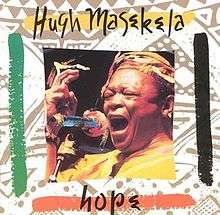Hope (Hugh Masekela album)
Hope is a 1994 live album by South African jazz trumpeter Hugh Masekela.[4][5]
| Hope | ||||
|---|---|---|---|---|
 | ||||
| Live album by | ||||
| Released | 1 February 1994 | |||
| Recorded | 30 July – 1 August 1993 | |||
| Studio | Blues Alley, Washington DC | |||
| Genre | Jazz | |||
| Length | 1:13:34 | |||
| Label | Triloka Records (TRICD82020) | |||
| Producer | Hugh Masekela, K.D. Kagel | |||
| Hugh Masekela chronology | ||||
| ||||
| Review scores | |
|---|---|
| Source | Rating |
| Allmusic | |
| The Encyclopedia of Popular Music | |
| The Rolling Stone Jazz & Blues Album Guide | |
Reception
Richard S. Ginell of Allmusic wrote "Now happily resettled in South Africa, Masekela assembled a seven-piece group there and recorded an informal guided tour of his life and repertoire live in Washington D.C.'s Blues Alley. The songs stretch over a period of nearly five decades and several countries and composers -- from an incantatory Alexandria township tune, "Languta," which he learned in 1947, to a fairly ordinary piece written by keyboardist Themba Mkhize in 1993, "Until When." "Abangoma" starts the CD out on the right track, hearkening back to the early fusion of African music and jazz that Masekela was playing back in 1966."[6]
Track listing
| No. | Title | Writer(s) | Length |
|---|---|---|---|
| 1. | "Abangoma (The Healers)" | Miriam Makeba | 4:59 |
| 2. | "Uptownship" | Hugh Masekela | 4:51 |
| 3. | "Mandela (Bring Him Back Home)" | Hugh Masekela | 5:09 |
| 4. | "Grazing in the Grass" | Harry Elston, Philemon Hou | 3:27 |
| 5. | "Lady" | Fela Kuti | 7:00 |
| 6. | "Until When" | Themba Mkhize | 4:08 |
| 7. | "Languta" | Hugh Masekela | 8:04 |
| 8. | "Nomali" | Caiphus Semenya | 8:55 |
| 9. | "Market Place" | Hugh Masekela | 5:28 |
| 10. | "Ntyilo Ntyilo (The Love Bird)" | Alan Salinga | 5:55 |
| 11. | "Ha le Se (The Dowry Song)" | Caiphus Semenya | 5:38 |
| 12. | "Stimela (The Coal Train)" | Hugh Masekela | 10:00 |
| Total length: | 01:13:34 | ||
Personnel
- Hugh Masekela – flugelhorn, trumpet
- Damon Duewhite – drums
- Bakithi Kumalo – bass, vocals
- Lawrence Matshiza – guitar, vocals
- Themba Mkhize – keyboards, vocals
- Remi Kabaka – percussion, vocals
- Ngenekhaya Mahlanghu – saxophone, flute, vocals, percussion
- Los Ballederos Hornas Africanos De Townsheep – backing vocals
gollark: "Mobile usability".
gollark: Yes, it is.
gollark: They will, of course, not explain where.
gollark: Yes, Google.
gollark: Hmm. Google is insisting that there is text which is too small to read on my site. I dislike this.
References
- "Hugh Masekela: Technobush". Allmusic. allmusic.com. Retrieved 16 May 2017.
- Larkin, Colin (May 27, 2011). The Encyclopedia of Popular Music. Omnibus Press. p. 1203. ISBN 978-0-85712-595-8. Retrieved 16 May 2017.
- Swenson, John (1999). The Rolling Stone Jazz & Blues Album Guide. Random House. Retrieved 23 September 2019.
Hugh Masekela
- "Hugh Masekela – Hope". Discogs. discogs.com. Retrieved 16 May 2017.
- "Hugh Masekela - Biography". Amoeba Music. amoeba.com. Retrieved 13 July 2017.
- "Hugh Masekela: Technobush". Allmusic. allmusic.com. Retrieved 16 May 2017.
This article is issued from Wikipedia. The text is licensed under Creative Commons - Attribution - Sharealike. Additional terms may apply for the media files.